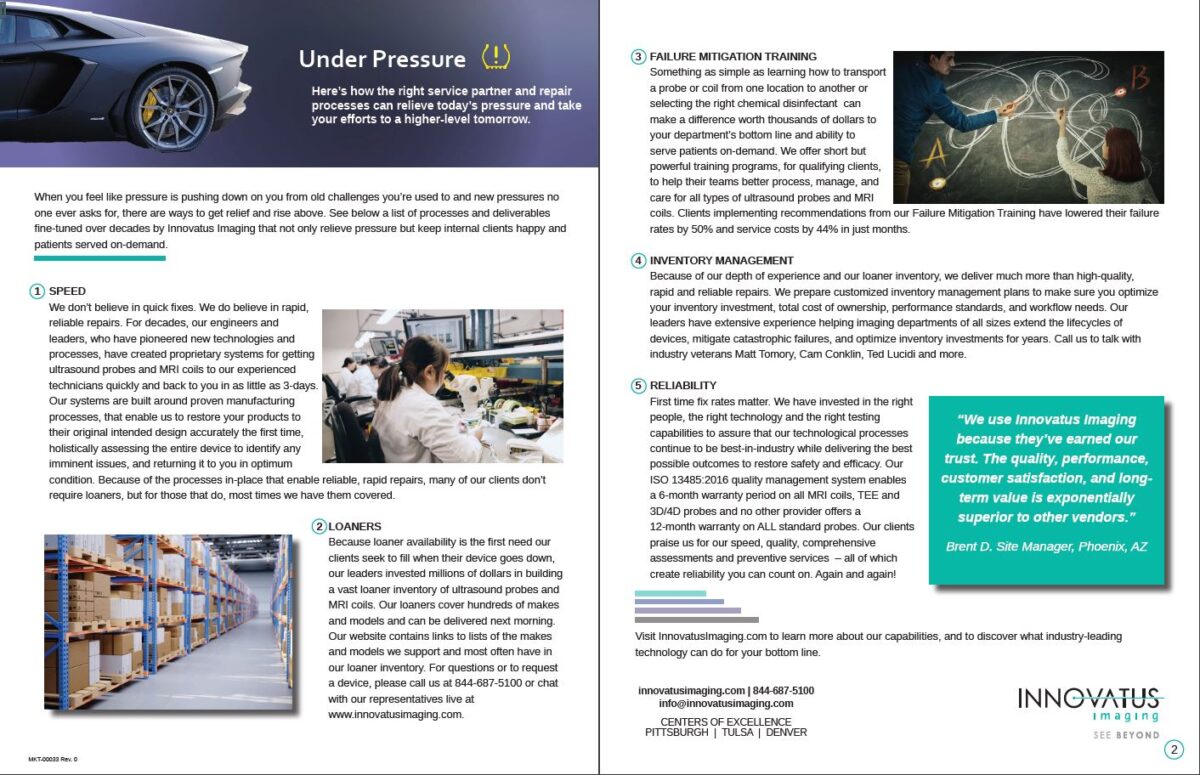So many choices…What repair partner should you choose, and why should they be chosen? 4-criteria for vendor qualification.
In the past, health care facilities used terms such as biomedical engineering and clinical engineering. These, once small, departments have since evolved. Now they can span entire health care enterprises and come complete with their own supply chains. Service decisions once made by individual technicians are now guided by large cross-functional teams. We now refer to these highly specialized departments as healthcare technology management (HTM). HTM has become big business and there are thousands of suppliers ready, willing and able to assist you with achieving your goals. The questions are, what repair partner should you choose, and why should they be chosen?
Each supplier, vendor, or provider (including OEMs) has its own pros, cons, and areas in which they choose to prioritize and focus. Very few excel at delivering all things to all customers. Developing a vendor scorecard helps to normalize all the variables and helps to define what’s most important to you, your department and your customers. Over the years, our team of industry experts have assisted many health care organizations and large enterprises with qualifying suppliers with respect to due diligence and research in developing effective requests for proposal (RFPs).
Following are 4-criteria for vendor qualification from a repair provider perspective.
- Provider-related questions
- How long has the provider been in business? How long have they provided the specific service? How many technicians or engineers are employed? What training do they receive? How and why is the provider qualified to work on the specific device(s)? Are you able to tour their facility? Will they allow you to interact with their teams? Would you be able to observe a repair being performed? Face-time Microsoft Teams, and Zoom are a great way to virtually tour a facility. Any quality supplier should be able to honor this request. Being able to thoroughly answer these questions and provide openness and transparency should be the minimum criteria you accept.
- Support-related questions
- What are the provider’s specialties/capabilities, and do they guarantee any capabilities? What is their annual repair volume? Do they perform ALL repairs in-house? If not, how much and exactly what is outsourced and is that important to you? Are loaners available? What is the cost and what fulfillment rate can be expected? What is included in the repair and what’s the typical turn-around time? With respect to ultrasound probes and MRI coils, typically, turn-around time is a function of the complexity of the device and invasiveness of the repair. A provider only performing low-level repairs at a low volume, no doubt, can promote a much faster repair time than a provider performing a thorough, fully invasive comprehensive repair.
- Quality-related questions
- What warranty period is offered and what is the current warranty rate on a specific product? Is the provider able to supply a service history or work history? You may not know it, but typically OEMs do not provide parts or materials to independent service organizations (ISOs) and many of the parts/components used in ultrasound probes are unable to be harvested for secondary usage. Knowing this, a good question to ask is, how are replacement parts and materials qualified? What is the process, what testing is performed, and how does the provider ensure the repaired/replaced device performs consistently with the OEM design? One type of testing used by Innovatus Imaging relative to material compatibility is to the ISO 10993 standard (which certifies bio-compatibility). At a minimum, when issuing an RFP, insist that a repair provider be ISO 13485:2016 certified in order to qualify.
- Key Performance Indicators
- First things first, establish what is important to you and your customers. Consider rating vendors based on overall quality of work, quality of communication, follow-up, call-back rate, warranty rate, response time, cost of downtime, etc. It is important to weight each criterion because your facility is unique as well as your customers’ needs and expectations. There is no universal model; however, price should never be the primary driver. Eventually decisions will be based upon price, but when choosing between repair providers, be sure to do an apples-to-apples comparison. Develop one or more very detailed scenarios, provide very specific details and require very specific answers that all lead to the bottom line.
So, What repair partner should you choose and why should they be chosen?
As an FDA registered medical device manufacturer and ISO 13485:2016 certified repair provider for ultrasound probes and MRI coils, developing successful partnerships with suppliers is integral to our quality management system. Part 7 of the 13485:2016 standard states that an organization SHALL establish criteria for the evaluation of suppliers which is based on:
- The suppliers’ ability to provide a product (or service) that meets the organization’s requirements,
- Is based on the performance of the supplier,
- Is based on the effect of the purchased product (or service) on the quality of the medical device, and
- Is proportionate to the risk associated with the medical device
In short, Innovatus Imaging develops a vendor scorecard for its suppliers. The beauty of the ISO:13485 standard is that, even though it may not need to be totally implemented in an in-house Clinical Engineering department, the standard can provide guidance and best practices to elevate any HTM department. Getting the most of your time, effort and budget are important now, more than ever. Knowing the 4-criteria for vendor qualification, what to ask, why it is important, and how to frame the questions are key to writing effective RFPs.
Reach out to the team of industry experts at Innovatus Imaging for assistance with adopting ISO 13485:2016 or before drafting your next RFP.
The right repair provider can relieve today’s pressure


